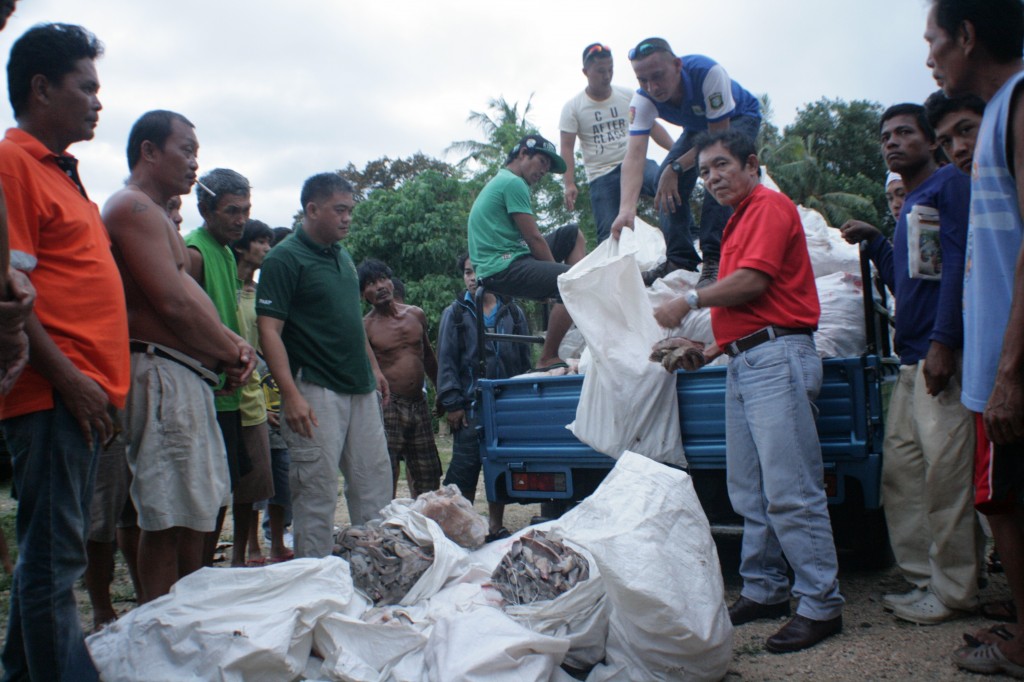Lapu-Lapu’s Task Force Kalikasan is not happy with the incompetence of the Bureau of Fisheries and Aquatic Resources – 7 to determine if the shark meat they seized are from protected shark species.
While admitting that the BFAR-7 does not have the equipment to determine shark species based on tissue samples from the seized meat, they concluded from their visual inspection of the 1,650 kilos seized by TF Kalikasan last Thursday evening that the meat came from Gummy Sharks which are not an endangered species.
And the BFAR found the permits submitted by Hope Walker, owner of H.A. Marine International which claimed ownership of the seized shark meat in order. The firm processes sharks’ fins into products that they export to other countries.
BFAR-7 Assistant Regional Director Allan Poquita said that based on their inspection, the 1,650 kilos confiscated sharks’ fins are from gummy sharks, which are not an endangered species.
Poquita said that from over 400 shark species from all over the world, only two kinds are considered endangered and are protected globally. These are whale sharks and great white sharks as listed in the Convention on International Trade in Endangered Species of Wild Fauna and Flora.
Aside from the two, here in Cebu, a provincial ordinance protects thresher sharks which is listed as ‘vulnerable to extinction’ by the International Union for the Conservation of Nature (IUCN).
Another shark species that is being hunted and traded in Cebu is the hammerhead shark which is also in IUNC’s Red List or list of threatened animals and plants.
PSupt. Virgil Ranes who led the Task Force Kalikasan (TFK) and Orlando Leyson, Chairman of the City Fisheries and Aquatic Resources Management Council (CFARMC) brought the samples of the confiscated shark meat to BFAR-7 office to seek assistance in determining the shark species for them to file appropriate charges against the involved persons.
But Leyson lamented that the BFAR-7 “did not even bother to take a closer look at the shark meat samples”.
Instead, they only checked on the documents containing the importation, BFAR certificates, Bureau of Customs documents and a business permit presented by Daniel Walker, who owns the shark meat before it was sold to a fish vendor in Pasil, Cebu City.
Vince Cinches, Greenpeace Southeast Asian Oceans Campaigner said, “Those shark meats that were apprehended should be submitted for analysis to the laboratory to identify if those are really gummy sharks. The BFAR-7 has all the resources.”
Ban all
Poquita, meanwhile said, that the BFAR-7 supports the move of the Cebu provincial government to ban the catching, selling and trading of sharks and its byproducts.
Although the BFAR still does not have scientific data on the conservation status of all shark species, Poquita said that Capitol’s proposal is tenable as a precautionary measure.
The BFAR-7, he said is waiting for the Cebu Provincial Government to call them for a technical meeting and discuss the matter.
Mayor Paz Radaza when sought for comment said that there should be clear basis when to prosecute violators She added they must establish laws and ordinances first so that the efforts of apprehending violators won’t be wasted. “Ato ning i-brought up ngato sa council,” (We will bring this up with the council) Radaza said.
The Task Force Kalikasan was tipped off by concerned citizens regarding shark meat being transported from Marigondon, Lapu-Lapu City to Cebu City.
The seized meat remains stored in the office of the Lapu-Lapu CFARMC and has started to spoil.
Poquita said that Walker still has to present a local transport permit before the seized meat can be released./ With reports from USJ-R Intern Mayfair dela Cerna
Related Stories:
1.6 tons of ‘shark meat’ seized in Lapu-Lapu
Fisherfolk, expert say shark meat ends up as fish balls
